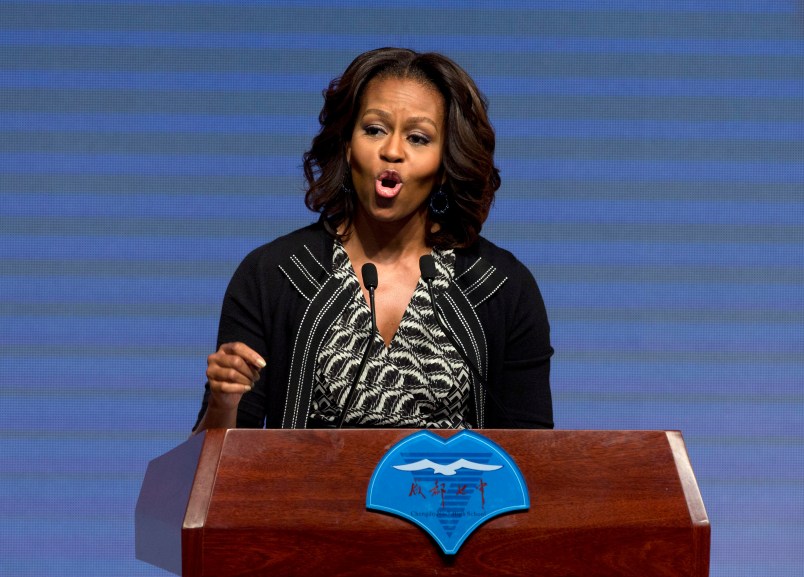BEIJING (AP) — U.S. first lady Michelle Obama encouraged rural Chinese students to aim high and get a good education despite humble roots, in a speech Tuesday that was delivered via satellite technology to remote communities in southwestern China.
She cited herself, basketball star LeBron James and Starbucks CEO Howard Schultz as examples of people with modest backgrounds succeeding, during her 15-minute presentation at Chengdu No. 7 High School in Sichuan province.
“Because in America, we believe that no matter where you live or how much money your parents have, or what race or religion or ethnicity you are, if you work hard and believe in yourself, then you should have a chance to succeed,” she said.
Her speech, on the last leg of a six-day, three-city tour of China, was delivered to a stadium of 700 students as well as to 12,000 rural students through satellite-enabled distance-learning technology.
Her appearance hewed to her stated goal of sticking to education and cultural exchanges, providing the kind of soft issues that can help loosen up China-US relations fraught with contentious disagreements over trade, cybersecurity and human rights.
“We can start with some soft issues to push for more engagements between China and the United States,” said Zhao Kejin, professor of international relations of Tsinghua University.
Access to education remains a major challenge for Chinese students in rural, remote and often impoverished communities, where per-student funding is usually a fraction of that in urban schools. Far fewer rural students can make it to top-notch Chinese colleges than their urban peers.
The elite high school in Chengdu — where most of its graduates pursue college education in prestigious Chinese universities or overseas — also has a reputation for using technology to bring quality education to impoverished remote regions.
Mrs. Obama offered some inspiration. “You see, the truth is that I grew up like many of you,” she said. “My mom, my dad, my brother and I, we lived in a tiny apartment in Chicago.
“My father worked at the local water plant,” she said. “And we didn’t have much money, but our little home was bursting with love.”
She said persevering was not easy. “But whenever I got tired or discouraged, I would just think about how hard my parents were working for me. And I would remember something my mother always told me — she said, ‘A good education is something that no one can take away from you.'”
The speech was followed with a question-and-answer session with 58 students in a classroom and 20,000 more students piped in via satellite technology. She later observed a student demonstration of the traditional Chinese exercise regime tai chi and tried a few moves.
Mrs. Obama has largely avoided thorny, political issues on her China trip, although she made a strong statement on behalf of free expression, choice of religion and unfettered access to information as “universal rights,” during a speech Saturday at the Stanford Center at Peking University in Beijing.
China has some of the world’s tightest restrictions on Internet discourse. Mrs. Obama’s remarks did not call out China directly and have not drawn any governmental protest. But that part of her speech has been kept out of all official Chinese media reports.
On Tuesday, she once again stressed how Americans value the freedoms of speech and belief.
“We also believe that everyone is equal, and that we all have the right to say what we think and worship as we choose, even when others don’t like what we say or don’t always agree with what we believe,” Mrs. Obama said.
While in Beijing, the first lady visited an elite high school, where more than 30 American students are studying as exchange students, and she held a private discussion with a handful of Chinese professors, students and parents.
Mrs. Obama met with Chinese President Xi Jinping on Friday, before Xi flew to The Hague for a nuclear security summit and held a meeting with President Barack Obama on Monday. She spent a full day with Xi’s wife Peng Liyuan earlier Friday, in what many Chinese analysts described as “first lady diplomacy” to help soften the US-China relationship.
Accompanied by her mother Marian Robinson and daughters Malia and Sasha, Mrs. Obama has toured the former Imperial Palace, the Great Wall in Beijing, and the Terra Cotta Museum in the ancient city of Xi’an.
She is schedule to visit a panda research center and lunch at a Tibetan restaurant Wednesday before departing for Washington.
Copyright 2014 The Associated Press. All rights reserved. This material may not be published, broadcast, rewritten or redistributed.






